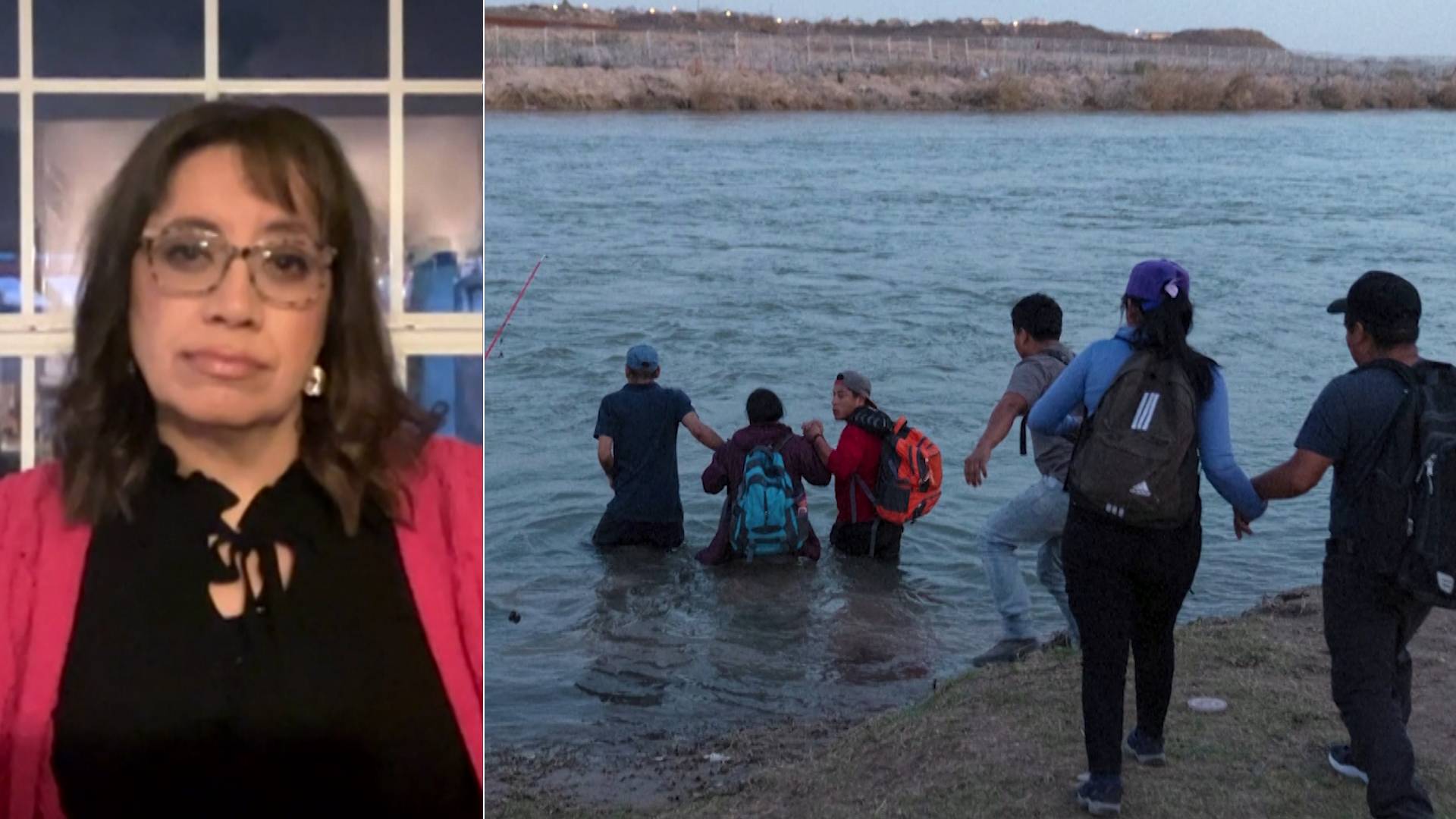This is a rush transcript. Copy may not be in its final form.
AMY GOODMAN: We begin today’s show in Texas, where the two leading presidential candidates visited the U.S.-Mexico border Thursday, as many voters say immigration continues to be a key issue. President Biden was joined on his trip to Brownsville by Homeland Security Secretary Alejandro Mayorkas, who was recently impeached by House Republicans over his handling of the border and immigration. Biden is reportedly considering a sweeping executive order to deny migrants the right to request asylum if they enter through unofficial ports of entry. The same authority was invoked by the Trump administration.
Meanwhile, Biden called on Donald Trump to back a bipartisan bill before Congress to further militarize the U.S.-Mexico border and crack down on asylum seekers and migrants.
PRESIDENT JOE BIDEN: Here’s what I would say to Mr. Trump: Instead of playing politics with this issue, instead of telling members of Congress to block this legislation, join me, or I’ll join you, in telling the Congress to pass this bipartisan border security bill. We can do it together.
AMY GOODMAN: Biden’s trip came the same day former President Donald Trump visited the Texas border town of Eagle Pass. Trump claimed the border was safer when he was in office, and used the term “invasion” to refer to asylum seekers forced to flee their home countries and arriving in the southern border. He also touted fake news about crime rates by undocumented immigrants and asylum seekers that are not backed by any evidence or data.
DONALD TRUMP: Now the United States is being overrun by the Biden migrant crime. It’s a new form of vicious violation to our country. It’s migrant crime. We call it Biden migrant crime, but that’s a little bit long, so we’ll just leave it. But every time you hear the term “migrant crime,” you know where that comes from. … Crooked Joe has the blood of countless innocent victims. It’s so many stories to tell.
AMY GOODMAN: This comes as a federal judge on Thursday temporarily blocked a new Texas law, set to go into effect soon, that would give police the power to arrest migrants they suspect of entering the U.S. without authorization.
For more, we’re joined in El Paso, Texas, by Marisa Limón Garza. She’s executive director of Las Americas Immigrant Advocacy Center, one of the groups challenging the Texas law, SB 4. She wrote an open letter to Eagle Pass and Brownsville ahead of Trump’s and Biden’s visits, that said, in part, quote, “The circus is coming to town. … Like you, we’ve become the proscenium” — or stage — “for all host of political theater focused on spectacle, sound bytes, and media clickbait.”
Marisa Limón Garza, welcome back to Democracy Now! Can you talk about the significance of these dueling trips and President Biden asking Trump to join him, or he said he would join Trump, in supporting increasingly harsh legislation around the border?
MARISA LIMÓN GARZA: Greetings. Thank you for having me.
It is not lost on Las Americas that this is a moment where, clearly, Texas has become a battleground for the soul of this nation. And Texas holds the largest land border with Mexico, and so it’s clear that both presidents — past president, present — and governors and the like are very interested in what happens at the southern border.
And so, it’s pathetic, frankly, to think that the far right has a satiable thirst. They are insatiable, and no amount of red meat in the form of borderland communities, people on the move, newcomers, neighbors alike, who have been here for decades and that are in mixed-status households, will ever be enough tribute to this particular political reality. And so, knowing that, it’s incredibly painful that both of these leaders used our communities, our borderland homes, as backdrops for their incredibly dangerous rhetoric.
Texas has very lax gun laws. We already know what happens when you mix this kind of rhetoric with xenophobia, access to semiautomatic rifles. We know that here in El Paso. They know that in Uvalde. They know that in Allen. We know this reality. And that’s why it’s incredibly painful, albeit not surprising.
AMY GOODMAN: Can you talk about what you understand President Biden’s plans are? Immigration is emerging as one of the top issues, if not the top issue, in a number of states’ primaries around the country. Now there’s word that President Biden, if he cannot get the legislation passed in Congress, will issue executive orders, much closer, more in line with what Trump did. Can you talk about what these might be and your concern, and if you feel that the Democratic administration of Joe Biden is hearing what immigrant rights activists on the ground are saying?
MARISA LIMÓN GARZA: Immigration has been a political football and a little bit of kryptonite for quite some time, going back, basically, until 9/11. And that’s when we saw a real shift in how we respond to this idea of this nation-state that is the United States and how people on the move can or cannot access territory and protection on U.S. soil.
So, we know that asylum is a completely legal, internationally recognized right. It is something that we, our Congress, has committed to. And yet this administration and administrations past have chipped away, chipped away, chipped away, through policy, through practice, through law, the ways that we actually live up to those values. And so it’s disappointing.
You know, we were part of conversations with the Biden administration when they were transitioning into office. And frankly, surviving the horrors of the Trump administration, knowing that our community was the laboratory for so much injustice, of zero tolerance, of family separation, of “Remain in Mexico,” of Title 42, of all of these laws and practices designed to keep people out, to say, through policy, “Do not come,” and to know that we now have a unified force, it doesn’t matter which party is taking on this issue. Ultimately, they are against people on the move. They are against Black, Indigenous, people of color, people of the Global South, people that are part of the LGBTQ+ community, mothers with children, unaccompanied children, like people who are living the reality of United States intervention and foreign policy, the result of the climate crisis, which is very much real and is causing people to flee. And then, the most ironic is the fact that we see people from around the globe. It’s not just Brown folks from Central America and South America here at the southern border. We see people from Africa. We see people from Europe. And so, the fact that we’re willing to invest so heavily in foreign wars, proxy wars, and think that it won’t cause more global migration is laughable.
And so it makes me question: What is the benefit? And to me, it’s clear: money and power. It always goes back to those things. And so, it’s amazing to think how much money is made on the back of someone on the move and how much power can be wielded and upheld. And it’s incredibly disappointing and sobering to know that it doesn’t matter which party. We’re never — we may be even at the table, but we’re still on the menu.
AMY GOODMAN: I want to go to Homeland Security Secretary Alejandro Mayorkas, who was with President Biden in Brownsville. This is what he said.
HOMELAND SECURITY SECRETARY ALEJANDRO MAYORKAS: You heard from DHS leadership about how resource-starved we continue to be. Only Congress can address our desperate need for more Border Patrol agents, field operations officers, immigration enforcement agents and officers, asylum officers, immigration judges, support personnel, facilities and technology. … We are removing and returning historic numbers of migrants who entered illegally and failed to qualify for relief. Just since mid-May, we have removed or returned more such migrants than in any full fiscal year since 2015.
AMY GOODMAN: Last month, the House Republicans voted to impeach Mayorkas, making him the first sitting cabinet member ever to be impeached, Republicans accusing him of failing to uphold immigration laws at the U.S.-Mexico border. If you can respond to what he said and also Trump repeating factually inaccurate lies? Just to clarify what “factually inaccurate” means, when he talked about the country being overrun by “Biden migrant crime,” “new form of vicious violation of this country,” the fact that migrant crime statistics are so much lower than crime statistics in the United States of everyday American citizens.
MARISA LIMÓN GARZA: I would share, you know, simply put, to the American public, they’re just being racist. There is no other way to describe it than the language coming out of the secretary’s mouth is one that still upholds policies of deterrence and cruelty. And the data shows, the record shows that more drones, more concertina wire, more buoys, more technology is only causing more harm and more death. This has been — this last year, 2023, was the most deadly on record for migrants in our area. And that’s because we are so rigid in the way that we’re responsive to the needs of human beings that have very real humanitarian reality at the southern border. And so, no, it’s racist, and it’s against human rights and the well-being of all people.
At Las Americas, we believe that people have a right to migrate, just as much as they have a right to thrive in place. And we also believe that people have a right to information that affects them. And the way that people are talking about these fellow humans is horrific.
AMY GOODMAN: Let me ask you about the significance of the court, Texas court, just blocking SB 4. And for people who don’t know what SB 4 is outside of Texas, explain.
MARISA LIMÓN GARZA: Sure. So, in the state of Texas every two years, our Legislature meets to pass laws and to govern, and usually we have a regular session. And this past year, 2023, we had four special sessions so that Governor Abbott and his cronies could push along legislation that they deemed appropriate for their Texas.
So, Senate Bill 4, that we are actually in active litigation against the state, along with the El Paso County, American Gateways and the ACLU, is the result of this effort to control the border, again, through violence and through harm. This racial profiling law, again, racist and actually goes against many other real Texas values, is designed to ask any person with probable cause if they entered into the United States from Mexico at an official port of entry where Texas holds, you know, a border.
And the law that Representative Spiller crafted, and that I testified against in a House hearing, is designed to impact the entire state. So, this is the folks in the Panhandle who are living climate change right now with the horrific wildfire. This looks like Houston, an international global city. And it looks like meatpacking towns and college towns and rural communities all across the state, the second largest in the country based on just geography. And the law is designed to affect anyone, regardless of class, status, education level, language. It’s an attack on Brown and Black bodies. And it’s designed to make us fearful. It’s designed to make us quiet. It’s designed to make us feel disenfranchised. And so, what we’re doing —
AMY GOODMAN: And it’s been blocked by the court now? It won’t go into effect next week?
MARISA LIMÓN GARZA: It’s not going — God willing, it won’t go into effect on the 5th. And we’re joyful. We are incredibly thrilled that this judge has stood, you know, in line with what we’re fighting for. And so, we know that this battle, you know, short, was won. We’re still in this longer, longer war. But we’re excited to continue the fight.
AMY GOODMAN: I wanted to ask you, finally, about what’s happening up here in New York. New York City Mayor Eric Adams spoke out in favor of modifying New York’s sanctuary laws to facilitate the deportation of immigrants. The sanctuary laws date back to the ’80s, prohibiting state and local government agencies from collaborating with federal immigration authorities. Can you explain what — the significance of what he’s proposing?
MARISA LIMÓN GARZA: It’s terrible, in a word. We have better solutions here at the southern border. We are partnering with USCIS, along with our counterparts in San Diego and Brownsville, to make sure that people are able to apply for work authorizations while they’re here at the southern border, and leave with actually that application, if not the authorization, to then go to interior communities, like New York City, and can then begin legally working and adding to the local economy almost immediately. And that would reduce the burden on any kind of social safety net and actually help meet what people on the move actually want, which is dignified work and the ability to have some resources to protect their families and loved ones.
AMY GOODMAN: We want to thank you so much for being with us, Marisa Limón Garza, executive director of Las Americas Immigrant Advocacy Center in El Paso, Texas.
When we come back, we look at an Intercept exposé of a controversial New York Times article alleging Hamas weaponized sexual violence on October 7th. Stay with us.











Post comments (0)